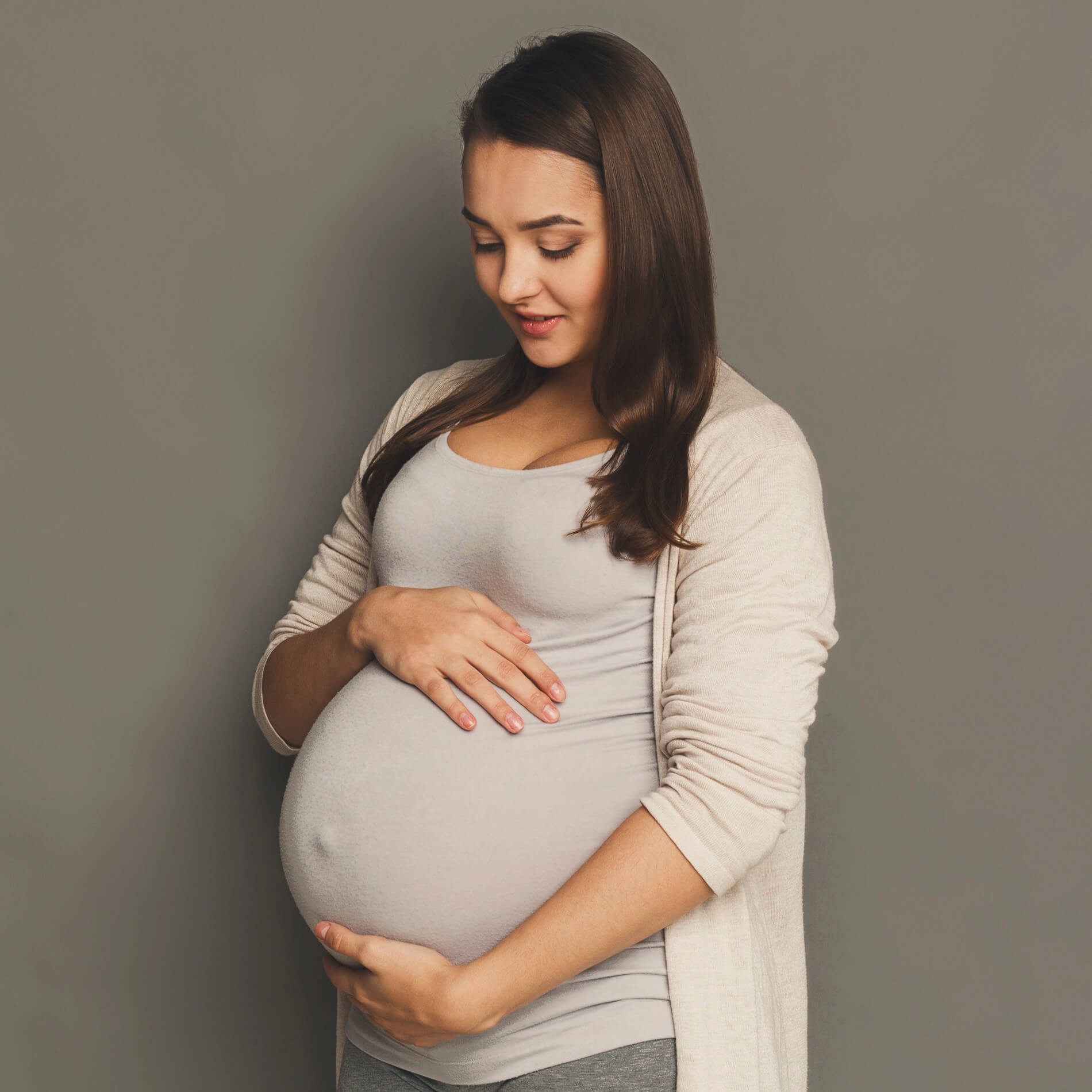Probiotics, Pre-eclampsia & Preterm Birth
A number of studies have yielded some very convincing results for the use of probiotics (see Probiotics Learning Lab) during pregnancy, suggesting that supplementing with friendly bacteria at this special time may help prevent preeclampsia, preterm birth, and neonatal sepsis.

This article looks at the following areas:
- Probiotics and pre-eclampsia
- Probiotics for preterm infants
- The role of probiotics and the vaginal microbiome
- Preterm birth and vaginal dysbiosis
- The importance of the infant gut microbiome
- The infant gut microbiome development
- Probiotics for the infant microbiome
Pre-eclampsia and preterm delivery (premature birth) are sadly all too common issues in pregnancy and create a risk of potentially very dangerous outcomes for mother and baby. Pre-eclampsia is responsible for the deaths of up to 75,000 women each year, whilst preterm birth and the resulting health complications are the biggest killers of children under 5 worldwide, most often due to neonatal sepsis. The use of medication during pregnancy is always a concern, but there are currently few if any viable medical solutions for the prevention of any of these conditions, so safe, natural, and effective solutions would be warmly welcomed by obstetricians.
Probiotics and pre-eclampsia
The first of these studies1 was conducted in Norway and monitored a total of 70,149 pregnant women. As part of the Norwegian Mother and Child Cohort Study (MoBa), the women were given three questionnaires to complete, one at week 15, the second at week 22, and the third at week 30. Questionnaires one and three included questions regarding the women’s intake of probiotic milk drinks and asked for details of when during the pregnancy the drinks had been consumed.
The results from 37,050 women were analysed to assess effects on pre-eclampsia, and the data from 34,458 women was used in the premature birth analysis.
The probiotic drinks commonly available in Norway at the time of the study contained two different combinations of probiotic strains: drink A contained Lactobacillus acidophilus LA-05®, Bifidobacterium lactis BB-12® and drink B contained Lactobacillus rhamnosus LGG® and Lactobacillus acidophillus LA-05® and Bifidobacterium lactis BB-12® The quantity and type of probiotic drinks consumed didn't seem to affect the results.
Analysis of the data yielded some very interesting findings, not just that the consumption of a probiotic milk appeared to reduce the risk of pre-eclampsia and pre-term birth, but that the timing of the probiotic supplementation might also be significant. In the preterm group, probiotic consumption was associated with an 11 percent lower risk of premature birth, rising to 27 percent for a preterm birth occurring later in the pregnancy. These results were observed in mothers who took the probiotic in early pregnancy. In the pre-eclampsia group, intake of the probiotic drink was associated with a 20 percent lower risk of the condition, but only when the probiotic was taken during late pregnancy.
Though this was purely an observational study from which no solid evidence can be derived, the results were still positive and measurable, and the study authors are calling for more research to be conducted to confirm their findings, not only to further explore the potential of probiotics during pregnancy, but also to ascertain the optimum time to take them for those who are at risk of either condition.

Probiotics for preterm infants
In another study2, researchers at Stanford University in California have been looking at possible links between a pregnant woman’s microflora (both in the gastro-intestinal tract and vaginal tract), and the likelihood of her giving birth prematurely.
The study group was made up of 49 pregnant women who all gave regular samples of their microflora throughout their pregnancies, and then again after the birth of their babies. It was the samples taken from the participants' reproductive tracts that proved to be of most interest to the study scientists, who believe that the findings could represent a real breakthrough for their research in to premature birth. Analysis showed that, of the 49 study participants, the 15 women that gave birth prematurely all showed abnormally low levels of bacteria from the Lactobacillus family, whereas those women that maintained their pregnancies to full term showed healthier levels of this particular genus of bacteria.
Premature birth can lead to many different long-term health consequences, some of which can be serious, such as neurological damage and chronic lung diseases, so anything that can be done to prevent this occurrence would be hugely beneficial, with every extra week spent in the womb being advantageous to the future health of the child.
Dr. Relman, who led the research, said that screening expectant mothers who are at a high risk of going in to premature labour could be identified using this bacterial analysis method. A targeted treatment plan could then be implemented to try to prevent them giving birth prematurely. He stated that a stitch could be placed in the neck of the womb to help prevent premature birth, or that the use of steroids could help to mature the babies’ lungs more rapidly in readiness for a predicted early birth.
Joe Leigh Simpson, from the U.S based ‘March of Dimes’ charity (a charity dedicated to helping mums have full-term pregnancies and healthy babies), said that another option would be to use probiotics to rebalance the levels of Lactobacilli in the reproductive tract. He went on to say that ‘having too few friendly bacteria may leave a woman’s womb open to attack by other bacteria and toxins, triggering early birth’.
Probiotics and the vaginal microbiome
It would make sense that rebalancing the vaginal microflora with the correct strains of bacteria that naturally colonise this area, would seem a better treatment option than giving steroids which are well known to worsen dysbiosis, or placing a stitch in the womb to physically ‘hold’ the foetus in place. If a lack of health promoting beneficial flora is a causative factor in premature birth, I would hope that replenishing that vital flora would be the first treatment option to be considered.
Two of the most prominent strains of Lactobacillus found in the vaginal tract are Lactobacillus rhamnosus GR-1® and Lactobacillus reuteri RC-14®. These strains are known to colonise the ‘intimate’ area and to adhere to the endothelial lining of the vaginal tract.
Another interesting point that the Californian study showed was that, even amongst the study participants that didn’t experience a premature birth, levels of friendly Lactobacillus bacteria still dropped dramatically after birth, and in some cases took as long as one year to return to normal. This could explain why having multiple pregnancies close together can be a risk factor for premature birth, as levels of protective Lactobacilli have not returned to normal between each pregnancy.

Preterm birth and vaginal dysbiosis
Increasingly, evidence is highlighting not just the importance of a healthy intestinal microbiome, but also the importance of maintaining the balance of bacteria in the delicate vaginal area. An imbalance of bacteria in the vaginal area has been associated with premature rupture of the amniotic sac, commonly known as the mother’s ‘waters breaking’, before 37 weeks.
In a study3 conducted at Imperial College London, data collected from a group of women suggested that mothers who experienced preterm pre-labour rupture of the foetal membranes (PPROM) displayed slight but measurable changes in the composition of their vaginal bacteria populations.
This change also appeared to increase the risk of sepsis in the new-born infant. As part of the study process, samples were obtained from 250 pregnant women, some of whom had a history of preterm birth or miscarriage, and of these women, 27 went on to deliver prematurely. Further samples were taken from a group of 87 women who were admitted to hospital with PPROM. The vaginal bacteria samples collected from all of the women who had given birth prematurely showed a drop in the numbers of beneficial Lactobacillus and an increase in harmful bacteria such as Staphylococcus and Streptococcus.
The study authors suggested that although antibiotics are typically used to reduce the risk of infections in these cases, for some women the medication seemed to actually increase the risk of infection in the baby. They hypothesised that the antibiotics were displacing good bacteria in the mum’s vaginal tract and allowing even more pathogenic bacteria to take their place.
Antibiotics may help to displace the pathogenic bacteria that often cause infection, but they can also disrupt the populations of good bacteria too, and often cause unpleasant side effects like diarrhoea. Many people like to take a probiotic that has been shown to help protect against the effects of antibiotics. Visit our Probiotics Learning Lab for more information about taking probiotics with antibiotics. Antibiotics may also cause thrush, so again, many people like to use a probiotic that’s been shown to help rebalance the vaginal microbiome and discourage pathogenic yeasts and bacteria from colonising in the vaginal tract.
The importance of the infant gut microbiome
Growth in newborns may be significantly influenced by their composition of gut flora. New research reveals connections between different bacteria characteristics and expected or reduced rates of growth in infants.
The research team from the Norwegian Institute of Public Health4 was led by the principal investigator Merete Eggesbo and looked at faecal samples from 218 infants taken on days 4, 10, 30 and 120 days after birth. The researchers developed a specific method to help identify periods of time when specific groups of bacteria were associated with stages of infant development by mapping part of the infant gut microbiota.
The study revealed that at day 30 in males, the detection of members of the Bacteroides genus was significantly associated with reduced growth whereas the presence of E. coli during the first month of life was linked to expected growth rates in both males and females. The researchers ‘found an indication that the composition of early life gut microbiota may be associated with how fast or slow babies grow in early life’, although they did note that the techniques used were very broad and so other early-life factors and gut bacteria characteristics may also be contributing to growth outcomes. Larger studies using the detection method which was developed during this study would therefore be needed to explore this area further.
The infant microbiome development
Another follow-up study from birth to 10 years indicated that a perinatal probiotic intervention helped reprogram the infant gut microbiome and avoid offspring obesity in childhood5, especially for children with a parent or sibling who suffered from immune diseases. Such studies suggest the inheritance of the maternal microbiome during pregnancy and emphasise the importance of maintaining homeostasis of the maternal microbiome before and after delivery. Other groups also confirmed the protective effect of probiotic interventions on restoring the maternal gut microbiome and preventing multiple gestation disorders such as GDM, dyslipidaemia, pre-eclampsia and excessive gestational weight gain. The most frequently used probiotics include strains from Bifidobacterium and Lactobacillus which modulate the gut microbiome by competing with and inhibiting pathogen adhesins. In addition, they produce antibacterial substances, SCFAs, and anti-inflammatory cytokines, increasing the mucus layer and cell junctions.
Probiotics for the infant microbiome
An exciting study6 carried out by the Royal Women’s Hospital in Melbourne discovered that supplementing breast milk with probiotic formula could significantly decrease the incidence of an inflammatory bowel disease in newborn babies.
Necrotising enterocolitis affects around 8% of premature babies and causes part of the baby’s intestines to die, with serious implications for their future health.
The study, published in the International Journal of Paediatrics, was co-authored by NICU Director Dr Sue Jacobs and Professor Suzanne Garland. It involved 1100 premature babies born before 32 weeks and weighing less than 1.5kg from 10 hospitals across Australia and New Zealand. Half of the babies were given the probiotics Bifidobacterium infantis, Streptococcus thermophilus, and Bifidobacterium lactis in the first days of their life and the study showed that the incidence of necrotising enterocolitis was reduced by up to 50% in the newborns being given the probiotics.
The study summarised that babies pick up their beneficial bacteria from their journey through the birth canal, and also through breastmilk, which are both linked to good immune function. When newborn babies are in intensive care, this can have a negative impact on their levels of beneficial bacteria, further affected by being given antibiotics.
Professor Suzanne Garland summarised by saying: “The bugs in your gut may well determine a lot of health outcomes, like allergies, in later life.”
In 2007, an analysis of various studies covering more than 1000 infants given different probiotic supplements7 found a reduced risk of necrotising enterocolitis in babies given probiotics as opposed to those on placebos. The report also stated a 53% reduction in the risk of mortality. Babies administered with probiotics were found to be 74% less at risk of developing necrotising enterocolitis - one of the commonest gastrointestinal diseases in premature infants.
The findings of these studies have highlighted the importance of the gut and vaginal microbiome during a healthy pregnancy and a potential role for probiotics to help support these. They have also highlighted the role of the infant microbiome and the part it plays in the growth and development of the infant. We can’t wait for more research to be done to confirm the results of these fascinating findings.
You might also be interested in:
Probiotics & Strep Infection in Pregnancy
Could Synbiotics Help Gestational Diabetes?
References
1. Nordqvist, M., Jacobsson, B., Brantsæter, A. L., Myhre, R., Nilsson, S., & Sengpiel, V. (2018). Timing of probiotic milk consumption during pregnancy and effects on the incidence of preeclampsia and preterm delivery: a prospective observational cohort study in Norway. BMJ Open, 8(1), e018021. https://doi.org/10.1136/bmjopen-2017-018021
2. Macrae, F. (2015, August 18). Probiotics can cut chances of an early birth: Findings could lead to tablet for mothers-to-be to ensure they have correct level of 'friendly bacteria' to prevent premature delivery. Mail Online. http://www.dailymail.co.uk/health/article-3201618/Probiotics-cut-chances-early-birth-Findings-lead-tablet-mothers-ensure-correct-level-friendly-bacteria-prevent-premature-delivery.html
3. Brown, R. G., Marchesi, J. R., Lee, Y. S., Smith, A., Lehne, B., Kindinger, L. M., Terzidou, V., Holmes, E., Nicholson, J. K., Bennett, P. R., & MacIntyre, D. A. (2018). Vaginal dysbiosis increases risk of preterm fetal membrane rupture, neonatal sepsis and is exacerbated by erythromycin. BMC Medicine, 16(1), 9. https://doi.org/10.1186/s12916-017-0999-x
4. White, R. A., Bjørnholt, J. V., Baird, D. D., Midtvedt, T., Harris, J. R., Pagano, M., Hide, W., Rudi, K., Moen, B., Iszatt, N., Peddada, S. D., & Eggesbø, M. (2013). Novel developmental analyses identify longitudinal patterns of early gut microbiota that affect infant growth. PLoS computational biology, 9(5), e1003042. https://doi.org/10.1371/journal.pcbi.1003042
5. Xiao, L., & Zhao, F. (2023). Microbial transmission, colonisation and succession: from pregnancy to infancy. Gut, 72(4), 772–786. https://doi.org/10.1136/gutjnl-2022-328970
6. Jacobs, S. E., Tobin, J. M., Opie, G. F., Donath, S., Tabrizi, S. N., Pirotta, M., Morley, C. J., Garland, S. M., & ProPrems Study Group (2013). Probiotic effects on late-onset sepsis in very preterm infants: a randomized controlled trial. Pediatrics, 132(6), 1055–1062. https://doi.org/10.1542/peds.2013-1339
7. Deshpande, G., Rao, S., & Patole, S. (2007). Probiotics for prevention of necrotising enterocolitis in preterm neonates with very low birthweight: a systematic review of randomised controlled trials. Lancet, 369(9573), 1614–1620. https://doi.org/10.1016/S0140-6736(07)60748-X
Popular Articles
View all Children's Health articles-
Children's Health18 Jan 2024


